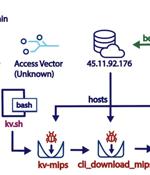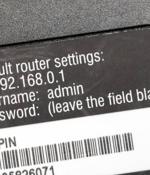Security News

CISA and the FBI warned today that threat actors using Androxgh0st malware are building a botnet focused on cloud credential theft and using the stolen information to deliver additional malicious payloads. "Androxgh0st is a Python-scripted malware primarily used to target.env files that contain confidential information, such as credentials for various high profile applications," the two agencies cautioned.

About Bruce Schneier I am a public-interest technologist, working at the intersection of security, technology, and people. I've been writing about security issues on my blog since 2004, and in my monthly newsletter since 1998.

A new Mirai-based botnet called NoaBot is being used by threat actors as part of a crypto mining campaign since the beginning of 2023. “The capabilities of the new botnet, NoaBot, include a...

A Mirai-based botnet named 'InfectedSlurs' is exploiting a remote code execution vulnerability in QNAP VioStor NVR devices to hijack and make them part of its DDoS swarm. The second zero-day vulnerability in the botnet's attacks is CVE-2023-47565, a high-severity OS command injection impacting QNAP VioStor NVR models running QVR firmware 4.x. QNAP published an advisory on December 7, 2023, explaining that the previously unknown issue was fixed in QVR firmware 5.x and later, which is available to all actively supported models.

A new botnet consisting of firewalls and routers from Cisco, DrayTek, Fortinet, and NETGEAR is being used as a covert data transfer network for advanced persistent threat actors, including the...

The Chinese state-sponsored APT hacking group known as Volt Typhoon has been linked to a sophisticated botnet named 'KV-botnet' since at least 2022 to attack SOHO routers in high-value targets. Volt Typhoon commonly targets routers, firewalls, and VPN devices to proxy malicious traffic so it blends with legitimate traffic to remain undetected.

Cybersecurity researchers have discovered a new variant of an emerging botnet called P2PInfect that's capable of targeting routers and IoT devices. The latest version, per Cado Security Labs, is...

The recently disclosed critical security flaw impacting Apache ActiveMQ is being actively exploited by threat actors to distribute a new Go-based botnet called GoTitan as well as a .NET program...

An active malware campaign is leveraging two zero-day vulnerabilities with remote code execution (RCE) functionality to rope routers and video recorders into a Mirai-based distributed...

Akamai has uncovered two zero-day bugs capable of remote code execution, both being exploited to distribute the Mirai malware and built a botnet army for distributed denial of service attacks. Because the security holes aren't plugged yet, Akamai's Security Intelligence Response Team did not name the brands or the affected devices.